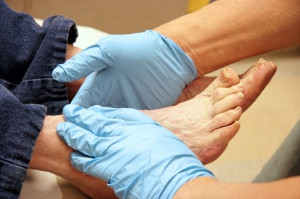Items filtered by date: June 2022
Risks of Stress Fractures in the Foot

Anyone who is active physically on a regular basis is a prime candidate for stress fractures. Among the main causes of these hairline cracks in a bone are changing your workout program, improper footwear, and improper technique. Going from running on turf to running on a road or other hard surface also may put you at risk. High-impact sports, such as soccer, running, basketball and dance, increase the likelihood of sustaining stress fractures. Non-athletes can also develop stress fractures, usually by increasing activity after refraining for a long time. Having osteoporosis and vitamin D deficiency, especially common among postmenopausal women, is another risk factor. If you have sustained stress fractures in the past, you are more likely to experience them again. If you suspect you may have developed stress fractures in your feet, it is a good idea to consult a podiatrist who can conduct a thorough examination and offer appropriate treatment options to reduce your pain.
Stress fractures occur when there is a tiny crack within a bone. To learn more, contact Jon McCreary, DPM from Fort Worth Podiatry. Our doctor can provide the care you need to keep you pain free and on your feet.
How Are They Caused?
Stress fractures are the result of repetitive force being placed on the bone. Since the lower leg and feet often carry most of the body’s weight, stress fractures are likely to occur in these areas. If you rush into a new exercise, you are more likely to develop a stress fracture since you are starting too much, too soon. Pain resulting from stress fractures may go unnoticed at first, however it may start to worsen over time.
Risk Factors
- Gender – They are more commonly found in women compared to men.
- Foot Problems – People with unusual arches in their feet are more likely to develop stress fractures.
- Certain Sports – Dancers, gymnasts, tennis players, runners, and basketball players are more likely to develop stress fractures.
- Lack of Nutrients – A lack of vitamin D and calcium may weaken the bones and make you more prone to stress fractures
- Weak Bones – Osteoporosis can weaken the bones therefore resulting in stress fractures
Stress fractures do not always heal properly, so it is important that you seek help from a podiatrist if you suspect you may have one. Ignoring your stress fracture may cause it to worsen, and you may develop chronic pain as well as additional fractures.
If you have any questions, please feel free to contact our office located in Fort Worth, TX . We offer the newest diagnostic and treatment technologies for all your foot care needs.
Gout Can Attack Your Big Toe

Gout is a condition caused by a buildup of uric acid directly related to foods that contain high levels of purines. The uric acid forms crystals that settle in the joints, commonly at the base of the big toe. This can cause sharp pain, inflammation, redness, and swelling. Foods that contain purines inhibit your body’s ability to shed uric acid properly. Men most often experience gout between the ages of 30 and 50, while women are more susceptible after the onset of menopause. Reducing the intake of purine-rich foods is a good way to prevent gout. Among them are beef, organ meats, certain types of seafood, as well as some vegetables and legumes. Drinking more water and less alcohol may also bring some relief. If you have developed gout, it is a good idea to see a podiatrist who can prescribe corticosteroids and other medicine to help reduce pain and uric acid levels.
Gout is a painful condition that can be treated. If you are seeking treatment, contact Jon McCreary, DPM from Fort Worth Podiatry. Our doctor will treat your foot and ankle needs.
What Is Gout?
Gout is a form of arthritis that is characterized by sudden, severe attacks of pain, redness, and tenderness in the joints. The condition usually affects the joint at the base of the big toe. A gout attack can occur at any random time, such as the middle of the night while you are asleep.
Symptoms
- Intense Joint Pain - Usually around the large joint of your big toe, and it most severe within the first four to twelve hours
- Lingering Discomfort - Joint discomfort may last from a few days to a few weeks
- Inflammation and Redness -Affected joints may become swollen, tender, warm and red
- Limited Range of Motion - May experience a decrease in joint mobility
Risk Factors
- Genetics - If family members have gout, you’re more likely to have it
- Medications - Diuretic medications can raise uric acid levels
- Gender/Age - Gout is more common in men until the age of 60. It is believed that estrogen protects women until that point
- Diet - Eating red meat and shellfish increases your risk
- Alcohol - Having more than two alcoholic drinks per day increases your risk
- Obesity - Obese people are at a higher risk for gout
Prior to visiting your podiatrist to receive treatment for gout, there are a few things you should do beforehand. If you have gout you should write down your symptoms--including when they started and how often you experience them, important medical information you may have, and any questions you may have. Writing down these three things will help your podiatrist in assessing your specific situation so that he or she may provide the best route of treatment for you.
If you have any questions, please feel free to contact our office located in Fort Worth, TX . We offer the newest diagnostic and treatment technologies for all your foot care needs.
Heel Pain and Children

Children and young teenagers who participate in running and jumping activities can be prone to developing Sever’s disease. This foot condition impacts the heel and typically affects children between the ages of 8 and 13. The Achilles tendon connects the heel to the calf muscles, and Sever’s disease may occur when the growth plate in the heel grows faster than the Achilles tendon. It is considered to be an overuse injury and can affect children who run and jump on hard surfaces. Effective prevention techniques include wearing quality shoes that fit correctly and have shock-absorbent soles, maintaining a healthy weight, and performing specific stretches for the heel. One such stretch, the heel drop, is accomplished by standing on a step and lowering one heel at a time until a gentle stretch is felt. If your child has heel pain, it is strongly suggested that he or she is under the care of a podiatrist who can effectively manage this condition.
Because RA affects more than just your joints, including the joints in your feet and ankles, it is important to seek early diagnosis from your podiatrist if you feel like the pain in your feet might be caused by RA. For more information, contact Jon McCreary, DPM of Fort Worth Podiatry. Our doctor will assist you with all of your podiatric concerns.
What Is Rheumatoid Arthritis?
Rheumatoid Arthritis (RA) is an autoimmune disorder in which the body’s own immune system attacks the membranes surrounding the joints. Inflammation of the lining and eventually the destruction of the joint’s cartilage and bone occur, causing severe pain and immobility.
Rheumatoid Arthritis of the Feet
Although RA usually attacks multiple bones and joints throughout the entire body, almost 90 percent of cases result in pain in the foot or ankle area.
Symptoms
- Swelling and pain in the feet
- Stiffness in the feet
- Pain on the ball or sole of feet
- Joint shift and deformation
Diagnosis
Quick diagnosis of RA in the feet is important so that the podiatrist can treat the area effectively. Your doctor will ask you about your medical history, occupation, and lifestyle to determine the origin of the condition. Rheumatoid Factor tests help to determine if someone is affected by the disease.
If you have any questions please feel free to contact our office located in Fort Worth, TX . We offer the newest diagnostic and treatment technologies for all your foot and ankle needs.
How Diabetes Can Affect the Feet

Diabetes occurs when the body does not produce sufficient insulin or use it properly, which causes blood sugar levels to rise above normal. Diabetes can affect the health of the feet as well as many other parts of the body. Uncontrolled high blood sugar levels can damage blood vessels, reduce the blood flow to feet, and have serious consequences. Diabetic neuropathy is a type of nerve damage that affects the feet and legs and that many of those with diabetes develop. Such nerve damage can cause tingling and numbness in the feet, and one might not feel pain from a foot problem - a key warning sign that something is amiss in the body. Infections can arise, and if not tended to and healed, can lead to gangrene where tissue dies from lack of blood flow. Another complication of diabetes is peripheral vascular disease, a circulation disorder that limits blood flow to the legs and feet. Healing takes longer with inadequate blood flow, putting one at risk for infections. It is important for those with diabetes to practice good foot care. Beyond taking prescribed diabetes medications and monitoring blood sugar levels, diabetics should keep their feet clean, dry, and moisturized, wear well-fitting shoes, examine feet regularly for any cuts, sores, or blisters, maintain a healthy body weight, and exercise regularly. If you have diabetes, it is suggested that you include a podiatrist on your team of doctors so they can help you catch any foot problems you may not feel or know about, treat any issues you are aware of, and help you maintain healthy feet.
Diabetic foot care is important in preventing foot ailments such as ulcers. If you are suffering from diabetes or have any other concerns about your feet, contact Jon McCreary, DPM from Fort Worth Podiatry. Our doctor can provide the care you need to keep you pain-free and on your feet.
Diabetic Foot Care
Diabetes affects millions of people every year. The condition can damage blood vessels in many parts of the body, especially the feet. Because of this, taking care of your feet is essential if you have diabetes, and having a podiatrist help monitor your foot health is highly recommended.
The Importance of Caring for Your Feet
- Routinely inspect your feet for bruises or sores.
- Wear socks that fit your feet comfortably.
- Wear comfortable shoes that provide adequate support.
Patients with diabetes should have their doctor monitor their blood levels, as blood sugar levels play such a huge role in diabetic care. Monitoring these levels on a regular basis is highly advised.
It is always best to inform your healthcare professional of any concerns you may have regarding your feet, especially for diabetic patients. Early treatment and routine foot examinations are keys to maintaining proper health, especially because severe complications can arise if proper treatment is not applied.
If you have any questions please feel free to contact our office located in Fort Worth, TX . We offer the newest diagnostic and treatment technologies for all your foot and ankle needs.

